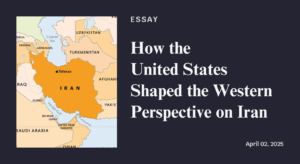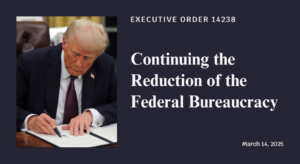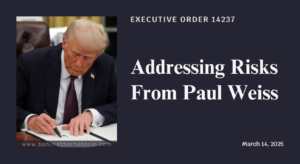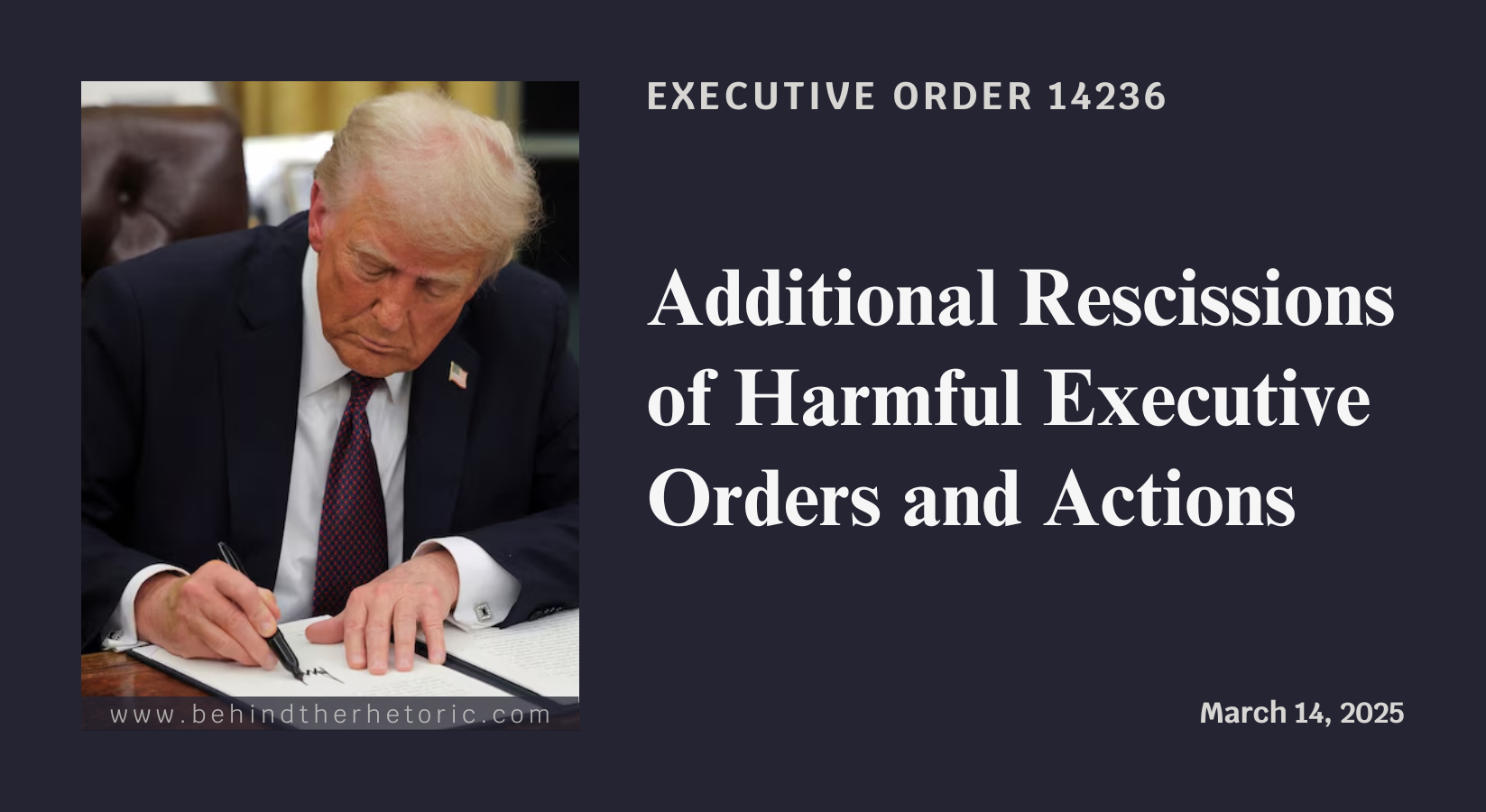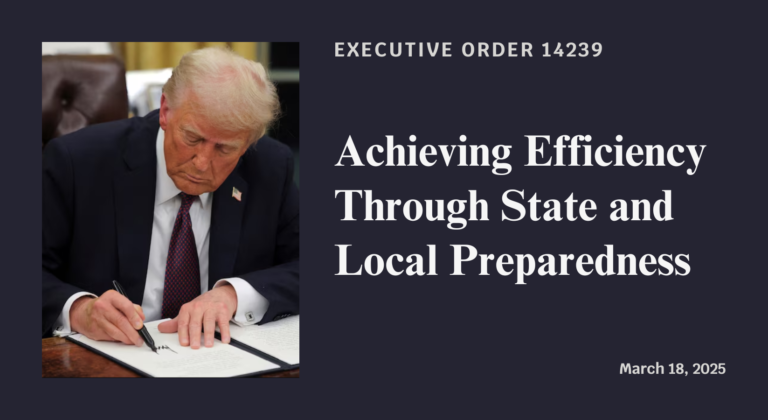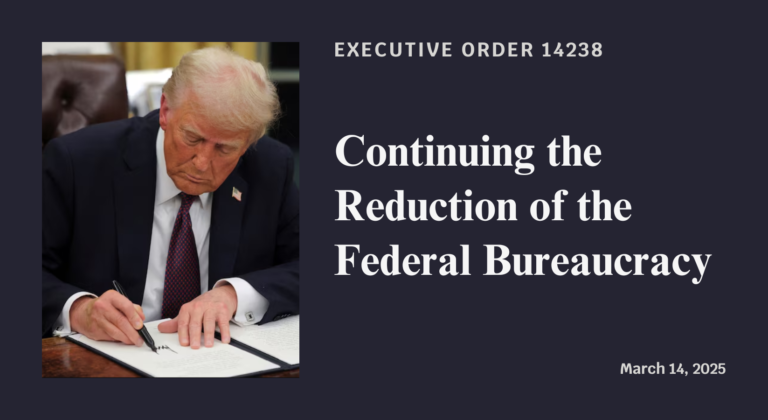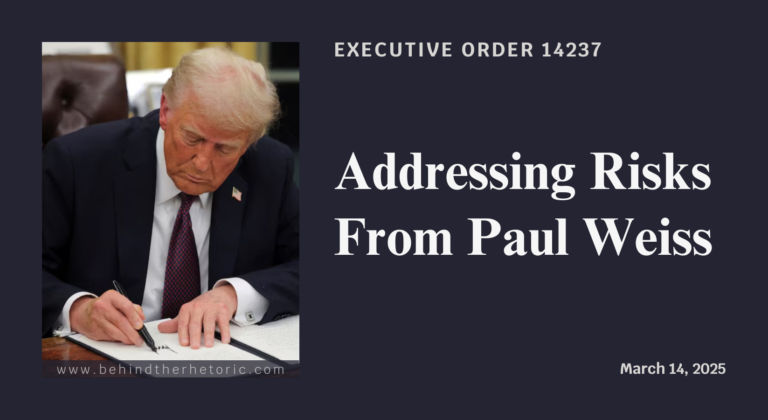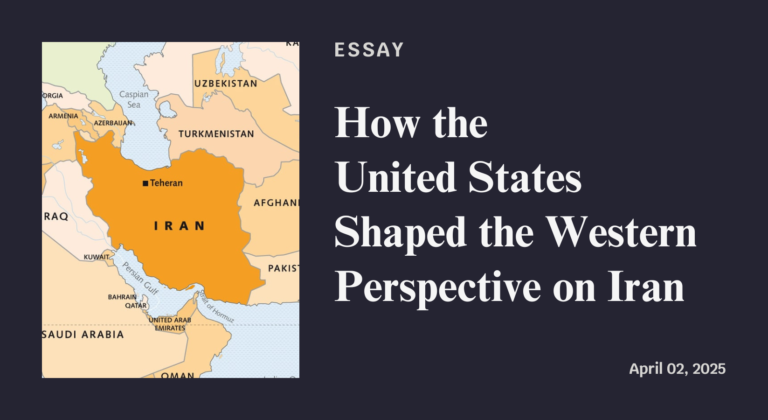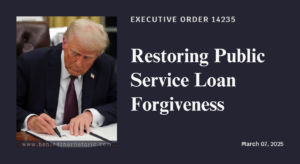Executive Order 14236
Additional Rescissions of Harmful Executive Orders and Actions
Signed on March 14, 2025
On March 14, 2025, President Trump signed Executive Order 14236, which revokes multiple executive orders, national security memoranda, and presidential determinations issued under the Biden administration. This order follows an earlier directive, Executive Order 14148, which rescinded 78 prior executive actions. The stated purpose of EO 14236 is to “restore common sense to the Federal Government” by reversing policies related to public health, worker protections, environmental innovation, international human rights, and federal labor programs.
🔗 Read the Executive Order on the Federal Register
🔗 Read the White House Announcement
What You Should Know
This order dismantles critical public health and pandemic preparedness policies.
One of the first executive orders revoked under EO 14236 is Executive Order 13994, which ensured a data-driven response to COVID-19 and future public health threats. This order established the coordination of pandemic response using real-time data, improved public health communication, and guided scientific research into infectious disease prevention. By rescinding this order, the administration is removing key pandemic preparedness mechanisms that helped the U.S. manage health crises and prevent unnecessary loss of life.
The minimum wage for federal contractors is being cut.
Executive Order 14026, signed in April 2021, mandated an increase in the minimum wage for federal contractors to ensure fair compensation and reduce economic disparities among government workers. The revocation of this order will result in wage cuts for thousands of federal contract employees, impacting low-income workers the hardest. Rolling back this policy does not create jobs or reduce costs—it simply lowers wages for workers already struggling to make ends meet.
Worker rights and labor protections are being rolled back.
The order revokes Executive Order 14119, which expanded the use of registered apprenticeships in industries and the federal government while promoting labor-management forums. It also nullifies a memorandum aimed at advancing worker rights and labor standards globally. These actions indicate a shift away from policies that protect workers, encourage fair labor practices, and provide opportunities for job training and career advancement.
Protections for LGBTQ+ individuals and human rights advocacy are being rescinded.
A key action revoked by EO 14236 is the Presidential Memorandum of February 4, 2021, which was focused on advancing the human rights of LGBTQ+ individuals worldwide. This memorandum aimed to combat discrimination, violence, and persecution against LGBTQ+ people and ensure U.S. foreign policy supported equal rights. Removing these protections signals a shift away from international human rights leadership and weakens support for marginalized communities.
Innovation in biotechnology and climate action is being abandoned.
Another major repeal under this order is Executive Order 14081, which advanced biotechnology and biomanufacturing innovation for a sustainable and secure American bioeconomy. This policy was designed to invest in scientific research, strengthen supply chains, and develop new technologies to address public health and environmental challenges. Eliminating these initiatives weakens U.S. competitiveness in the global biotech industry and reduces investment in sustainable technologies.
Infant formula supply chain protections are being revoked.
A May 2022 presidential determination delegated authority under the Defense Production Act to ensure an adequate supply of infant formula during a national shortage. By rescinding this directive, the administration is removing emergency powers that helped prevent future formula shortages, leaving the industry more vulnerable to disruptions and price gouging.
Tribal nations will face reduced federal support.
The revocation of Executive Order 14112, which focused on reforming federal funding and support for tribal nations, will hinder self-determination efforts and economic development in Indigenous communities. The original order was designed to ensure that tribal governments had the resources and autonomy to manage federal funding efficiently and address local challenges. Removing this policy will likely create bureaucratic barriers, reduce funding accessibility, and slow progress on key initiatives for tribal sovereignty.
Who Wins?
Corporations and industries opposed to labor regulations.
By revoking policies that raised wages, expanded labor protections, and strengthened worker rights, the administration is prioritizing corporate interests over employee well-being. Large corporations that rely on federal contracts will no longer be required to pay a higher minimum wage, allowing them to maximize profits while employees see reduced earnings.
Right-wing politicians and anti-LGBTQ+ advocacy groups.
The repeal of international LGBTQ+ protections and worker empowerment initiatives aligns with efforts by far-right political groups to dismantle civil rights policies. Advocacy organizations that oppose workplace protections and human rights initiatives will benefit from these rollbacks, reinforcing discriminatory policies on a global scale.
Fossil fuel and extractive industries.
By eliminating biotechnology innovation programs and sustainability-focused economic policies, this order benefits fossil fuel companies and other industries that have resisted environmental regulations. Without federal incentives for alternative energy and biomanufacturing, investment in these areas will decline, favoring traditional energy sources over sustainable solutions.
Political allies of the administration seeking to reduce federal oversight.
Rolling back policies that strengthened labor rights, expanded pandemic preparedness, and reformed federal funding allows for greater executive control over government functions. This benefits political appointees and industry leaders who prefer fewer regulations and less oversight of corporate and labor practices.
Who Loses?
Federal contract workers and low-wage employees.
By revoking the federal contractor minimum wage increase, thousands of workers will see pay cuts, making it harder to afford basic necessities. Rolling back policies that supported apprenticeships and labor rights will also reduce job training opportunities and worker protections.
Public health and pandemic preparedness efforts.
The repeal of Executive Order 13994 removes key data-driven public health strategies designed to respond to pandemics and high-consequence public health threats. This weakens the nation’s ability to track, prepare for, and mitigate future outbreaks, increasing the risk of preventable deaths.
LGBTQ+ individuals and human rights advocates.
Eliminating international protections for LGBTQ+ people sends a clear message that the administration does not prioritize human rights. This will have global consequences, as countries that rely on U.S. leadership in human rights advocacy may feel less pressure to protect marginalized populations.
Tribal nations and Indigenous communities.
The removal of Executive Order 14112 weakens federal support for tribal governance and economic self-sufficiency. Indigenous communities that rely on streamlined access to federal resources will face new bureaucratic hurdles, delaying critical infrastructure and development projects.
The U.S. bioeconomy and scientific innovation.
By rescinding Executive Order 14081, which promoted biotechnology and biomanufacturing, the administration is reducing federal investment in science, technology, and sustainability. This move puts the U.S. at a competitive disadvantage in emerging industries and slows innovation in critical fields such as medicine, environmental science, and supply chain resilience.
Executive Order 14236 represents a sweeping rollback of policies designed to protect workers, support public health, advance human rights, and invest in scientific innovation. The decision to revoke these executive actions disproportionately benefits corporations, right-wing political groups, and industries that oppose labor and environmental regulations. Meanwhile, low-wage workers, marginalized communities, and public health initiatives will suffer the most from these policy reversals.
Rather than fostering economic growth and innovation, this order prioritizes deregulation at the expense of long-term sustainability and equity. The consequences of these rollbacks will be felt across multiple sectors, from labor rights to biotechnology, leaving many Americans with fewer protections and opportunities.
Take Action
Support workers’ rights and fair wages.
Advocate for state and local policies that raise the minimum wage and protect workers from unfair labor practices. Since federal protections are being weakened, state and municipal governments must step in to ensure fair wages and safe working conditions.
Stay informed and challenge misinformation about pandemic preparedness.
Public health initiatives save lives, yet this administration is actively rolling back pandemic response strategies. Share reliable sources of information and support policies that protect public health infrastructure.
Defend LGBTQ+ rights and international human rights initiatives.
Organizations that support human rights need public backing more than ever. Support groups advocating for LGBTQ+ protections, workers’ rights, and global human rights to counteract these harmful policy changes.
Demand investment in sustainable technologies and scientific innovation.
Call on lawmakers to fund research and development in biotechnology, biomanufacturing, and sustainable energy, ensuring that the U.S. remains a global leader in science and innovation.
Misinformation and political rhetoric often obscure the real consequences of policy decisions. Stay informed, question narratives that favor corporate interests over public well-being, and hold leaders accountable for actions that negatively impact workers, public health, and scientific progress.
